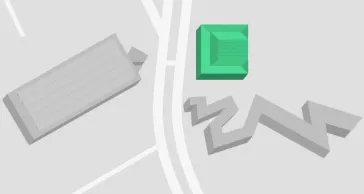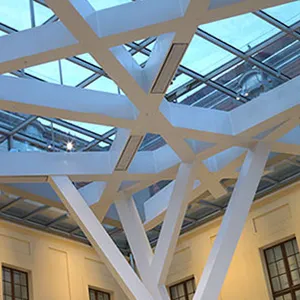From a Berlin Farce to a Story of Success
The Emergence of the Jewish Museum Berlin (audio recording available, in German)
The Jewish Museum Berlin continues to be one of Germany’s most successful museums and the Libeskind Building a landmark of international renown.
How did it come about that the former Supreme Court building in Kreuzberg’s Lindenstraße, which housed the historic city museum of West Berlin founded in the 1960s, is now home to the Jewish Museum Berlin? How did the project of expanding the Berlin Museum to include a Jewish department become a national museum of German-Jewish history under the patronage of the Federal Republic?
The author Daniel Bussenius speaks to curator Inka Bertz and “ZEIT” journalist Heinrich Wefing about the emergence of the museum and the controversies that accompanied its founding in the years from 1971 to 2001.
recording available

Where
Old Building, level 2, Great Hall
Lindenstraße 9–14, 10969 Berlin
Participants
Inka Bertz is head of collections and art curator at the Jewish Museum Berlin. She has curated exhibitions and published on Jewish art and cultural history, including Eine neue Kunst für ein altes Volk. Die Jüdische Renaissance in Berlin 1900–1924 (A new art for an ancient people. The Jewish Renaissance in Berlin 1900–1924) in 1991 and Familienbilder. Selbstdarstellung im jüdischen Bürgertum (Family Portraits: Self-Image Among the Jewish Bourgeoisie, Dumont) in 2004.
Daniel Bussenius was awarded a doctorate from the Humboldt University Berlin for his dissertation on the history of politics considering the 1848 revolution of the First Republic of Austria and the Weimar Republic in the years 1918 to 1933/34. Parallel to this, he was research assistant to Professor W. Michael Blumenthal for his autobiography Around the World in Eighty Years. He works as a freelance historian and editor in Munich.
Heinrich Wefing is deputy politics editor for “ZEIT” in Hamburg. He studied law and art history in Bonn and Freiburg and wrote for the “FAZ” feuilleton for eleven years, first as Berlin correspondent, then in San Francisco, and lastly as head of the feuilleton office in Berlin. Since 2008, he has worked for “ZEIT” in Hamburg in the areas of legal policy, network and society, and USA. His Gebrauchsanweisung für Kalifornien (Instruction manual for California, Piper) was published in 2011 and Der Fall Demjanjuk. Der letzte große NS-Prozess (The Demjanjuk case. The last big Nazi trial, C.H. Beck) in 2005. He lives in Hamburg.
Moderated by Cilly Kugelmann

Audio recording of the book presentation, in German; Jewish Museum Berlin 2015
About the Series
The Studies of the Jewish Museum Berlin address the diversity of the Jewish experience in the context of general historical and cultural developments in Germany and Europe. They explore questions about the representation of history and reflect on the impact of the Diaspora on Jewish tradition and the social and political developments of the present. The first volume, From a Berlin Farce to a Story of Success. On the Origins of the Jewish Museum Berlin 1971–2001 will be presented at this event.
Volume 2 of the academic book series was published as the Jewish Museum’s first open access publication. Hear the Truth, Whoever Speaks It. Milestones in the Work of Moses Maimonides from Islamic Spain to Modern Berlin (Ed. Lukas Mühlethaler) illuminates on the one hand characteristic aspects of Maimonides’ work with respect to the Almohad revolution in Muslim Spain, on the other unknown Muslim and Christian interpretations of his work.
A discussion as a prelude to the Jewish Museum Berlin's academic book series
A cooperation with Vandenhoeck & Ruprecht Publishers




